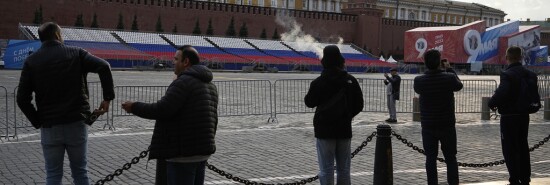
Did Ukraine attack the Kremlin or did Russia?
Tom Rogan
Video Embed
Russia says that Ukraine launched two drones in an overnight assassination attempt against President Vladimir Putin. Ukraine denies the allegation.
There are three possibilities here: Either Ukraine, Russia, or some other entity was responsible. The third option seems unlikely for reasons of practicality and motive. That leaves Ukraine or Russia.
UKRAINE ESCALATES SABOTAGE OPERATIONS AHEAD OF COUNTEROFFENSIVE
Ukraine’s repeated attacks on logistics hubs deep inside Russian territory indicate that it has at least the feasible capacity for this kind of attack. The suspected Ukrainian assassination of Darya Dugina outside of Moscow last August indicates Ukraine has some operational capacity even within the Russian capital. It is also true that Ukrainian government officials have played into Russia’s hands with their unfortunate penchant for lying when it suits their own interests.
Nevertheless, this record doesn’t mean Ukraine was responsible for the drones. Even if it is corrupt, the Federal Protective Service that is responsible for protecting Putin and the Kremlin is a capable organization. Counterintelligence concerns aside, the U.S. Secret Service regards the FSO as competent and easy to work with, for example. It is strange and perhaps suspicious that the FSO did not detect and destroy these drones at a greater range from the Kremlin.
In addition, the United States has privately but heavily pressured Ukraine to avoid attacks such as this one. Moreover, this action would also have had a purely psychological intent if Ukraine were responsible. The Ukrainians are not stupid. They know that Putin does not live in the Kremlin but rather 16 miles away at his Novo-Ogaryovo residence in the western Moscow suburbs. Attempting to assassinate Putin by flying drones toward the Kremlin overnight is tantamount to attempting to assassinate Biden by flying drones toward Congress on a non-State of the Union night. It makes no sense. What this action could accomplish, however, is to inflict a psychological blow on Russian power structures and popular pride. Perhaps that was sufficient motive for Ukraine?
Alternatively, perhaps that was sufficient motive for Russia.
The Kremlin warned earlier this week that Ukrainian terrorists were plotting attacks to coincide with Russia’s annual World War II victory celebration on May 9. As I noted on Tuesday, “While Ukraine has been careful, under significant Western pressure, to avoid Russian civilian casualties (such as with the recent railway attacks), the Kremlin has a record of conducting false flag terrorist attacks on its own soil. A Russian intelligence service penchant dating back to the Czarist era, these efforts are designed to boost popular resolve against an external enemy.”
Hyperventilating Russian state media and state-aligned media coverage since the drone incident gives credence to this possibility. An editorial by the Moskovskij Komsomolets newspaper observed that “if the drone attack on the Kremlin proved anything, it’s probably this: what was recently considered unthinkable is quickly becoming part of the routine.” Another Moskovskij Komsomolets editorial said that the attacks proved the Russian people had to “wake up” as the “enemy are at the Kremlin.” The Duma’s speaker, Vyacheslav Volodin, said he would now “demand the use of weapons that are capable of stopping and destroying the Kyiv terrorist regime” (a hint at nuclear weapons). And the FSB domestic security service announced that it had disrupted a Ukrainian plot to use “British explosives” to assassinate senior officials in Crimea.
All of this indicates a desire by the Kremlin to use the drone attack for national mobilization in support of its war in Ukraine. The drone incident aside, the need for such a mobilization is underlined by the struggle of Russian forces in Ukraine and Moscow’s fear that Kyiv is about to launch a highly successful counteroffensive toward Crimea. The Kremlin may have staged this incident in order to make the far-concern of the Ukrainian war a more urgent concern for the domestic population.
Russia certainly has a penchant for so-called “false flag” attacks that it carries out and then blames on others. One more ludicrous example was the Kremlin’s claim last year that Ukraine and the CIA were trying to assassinate a top Russian media propagandist. This narrative was undermined when Russian photos of the suspect’s residence showed three copies of The Sims (a video game), evincing an apparent failure by someone to understand the instruction, “Go buy three SIM cards.”
Regardless, as evinced by Nikolai Patrushev’s rising influence and Dmitry Medvedev’s morphing into a hawk, it’s clear that the Kremlin’s power dynamics are moving against moderation. Putin’s regime appears to be banking on eventual Western division over continued support to Ukraine. But whether Ukraine or Russia was responsible for these drones, Putin’s war effort is in deep trouble.
